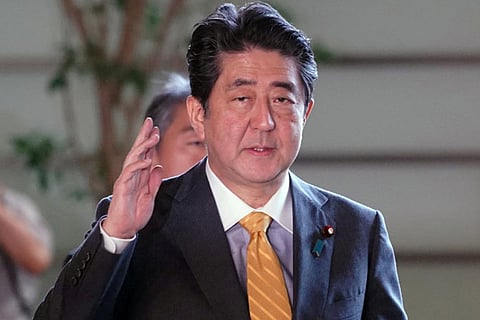

Tokyo
First, however, he must confront the immediate challenge of a likely summit with U.S. President Donald Trump next week, when he will face pressure to cut Japan’s $69 billion surplus with its key ally, nearly two-thirds from auto exports.
Abe must also keep economic growth on track with a dwindling policy tool-kit. After years of heavy money printing, the Bank of Japan has little ammunition left. Japan’s huge public debt and rising social welfare costs for a fast-ageing population also leave Abe with little room to ramp up fiscal spending.
Abe, who surged back to power in 2012 promising to reboot the economy and strengthen defense, is widely expected to defeat former defense minister Shigeru Ishiba in the election for Liberal Democratic Party (LDP) chief, so attention will focus on how many of the 810 votes up for grabs Ishiba manages to get.
Of the 810 votes, 405 are from LDP members of parliament and 405 are apportioned based on votes by rank-and-file party members. A strong showing by Ishiba would suggest Abe could face a harder time pushing his agenda.
Kyodo news agency, citing an unidentified source, said on Thursday popular young LDP lawmaker Shinjiro Koizumi, often mentioned as a possible future premier, was likely to vote for Ishiba.
However, the move by the son of former prime minister Junichiro Koizumi was probably too late to have much impact on the vote, said Sophia University professor Koichi Nakano.
TRADE IMBALANCE
Abe is expected to meet Trump on the sidelines of a U.N. General Assembly meeting next week. They have forged close ties but Trump has made clear he’s unhappy about the bilateral trade imbalance and wants a two-way agreement to address it.
Tokyo opposes a bilateral deal for fear it would boost pressure on sensitive sectors such as agriculture.
The Trump administration is also exploring raising tariffs on Japanese auto exports, a step Japanese officials say would do serious damage to the two economies and world trade.
At home, the premier’s “Abenomics” recipe of hyper-easy monetary policy, spending and structural reform has helped reflate growth, although critics say reforms came up short.
Now he is pledging to reform social security, making it easier for people to stay in the workforce and offset Japan’s shrinking population by raising the retirement age to above 65 and letting them defer pension payouts beyond age 70.
Abe is also promising to invest in infrastructure to cope with the natural disasters that increasingly batter Japan, though more spending could make it harder to rein in debt.
He has said he will implement a planned rise in the sales tax to 10 percent from 8 percent in October 2019 but that could hit the economy just as Trump’s protectionist policies could hurt Japanese exports.
High among Abe’s personal priorities is revising the post-war constitution’s pacifist Article 9 to clarify the military’s ambiguous status. The article, if taken literally, bans maintenance of armed forces but has been interpreted to allow a military for self-defense.
The amendment would be a largely symbolic change, but pushing for it would be politically risky since the public is divided. Amendments require approval by two-thirds of both houses of parliament and a majority in a public referendum.
Visit news.dtnext.in to explore our interactive epaper!
Download the DT Next app for more exciting features!
Click here for iOS
Click here for Android